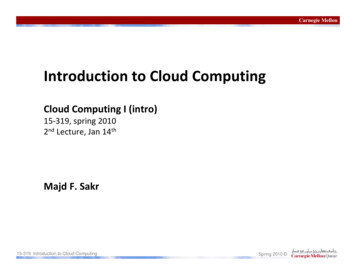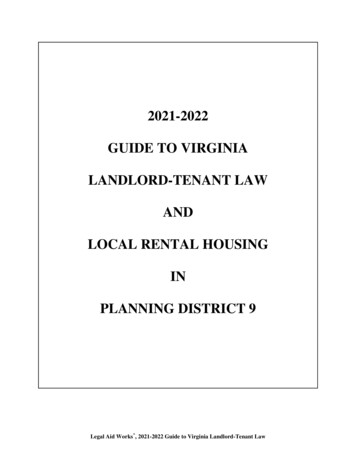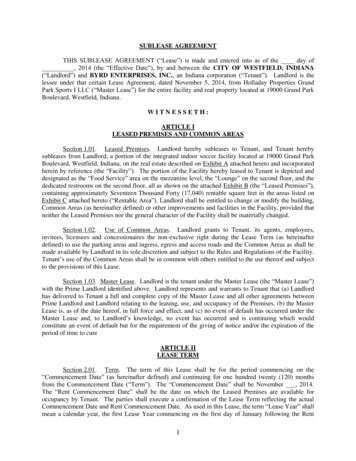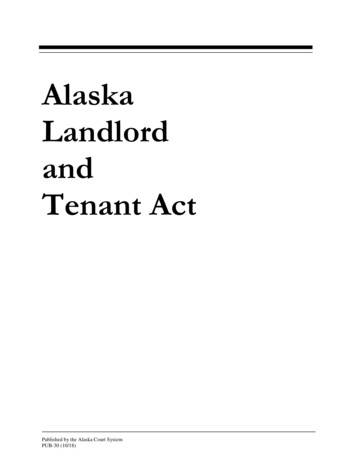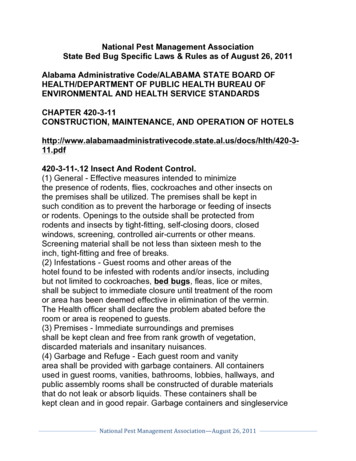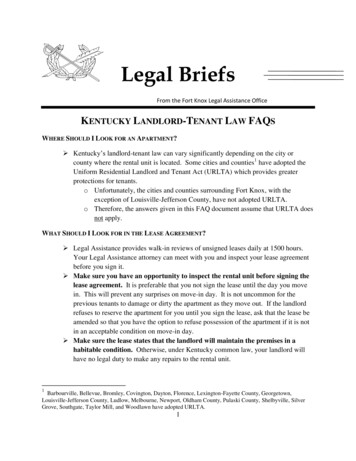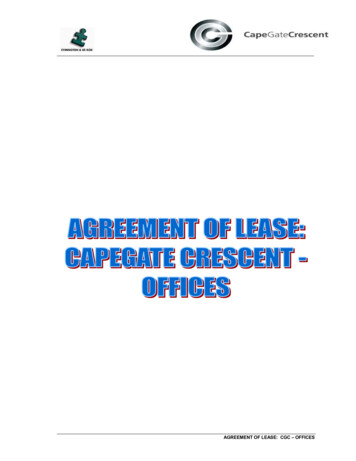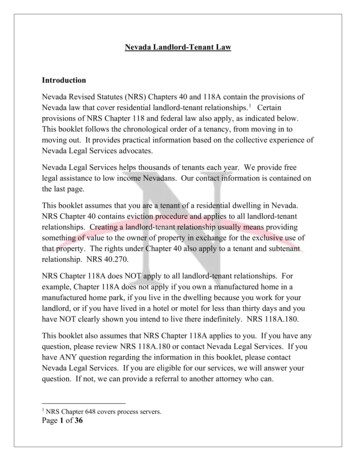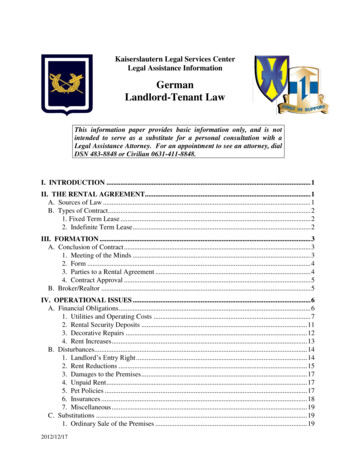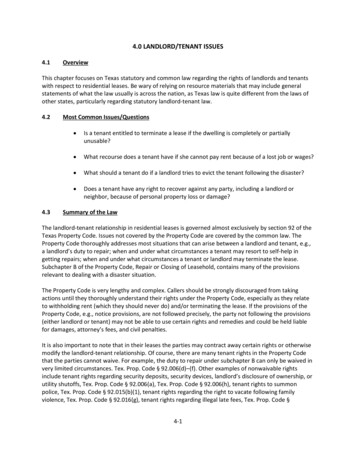
Transcription
4.0 LANDLORD/TENANT ISSUES4.1OverviewThis chapter focuses on Texas statutory and common law regarding the rights of landlords and tenantswith respect to residential leases. Be wary of relying on resource materials that may include generalstatements of what the law usually is across the nation, as Texas law is quite different from the laws ofother states, particularly regarding statutory landlord-tenant law.4.24.3Most Common Issues/Questions Is a tenant entitled to terminate a lease if the dwelling is completely or partiallyunusable? What recourse does a tenant have if she cannot pay rent because of a lost job or wages? What should a tenant do if a landlord tries to evict the tenant following the disaster? Does a tenant have any right to recover against any party, including a landlord orneighbor, because of personal property loss or damage?Summary of the LawThe landlord-tenant relationship in residential leases is governed almost exclusively by section 92 of theTexas Property Code. Issues not covered by the Property Code are covered by the common law. TheProperty Code thoroughly addresses most situations that can arise between a landlord and tenant, e.g.,a landlord’s duty to repair; when and under what circumstances a tenant may resort to self-help ingetting repairs; when and under what circumstances a tenant or landlord may terminate the lease.Subchapter B of the Property Code, Repair or Closing of Leasehold, contains many of the provisionsrelevant to dealing with a disaster situation.The Property Code is very lengthy and complex. Callers should be strongly discouraged from takingactions until they thoroughly understand their rights under the Property Code, especially as they relateto withholding rent (which they should never do) and/or terminating the lease. If the provisions of theProperty Code, e.g., notice provisions, are not followed precisely, the party not following the provisions(either landlord or tenant) may not be able to use certain rights and remedies and could be held liablefor damages, attorney’s fees, and civil penalties.It is also important to note that in their leases the parties may contract away certain rights or otherwisemodify the landlord-tenant relationship. Of course, there are many tenant rights in the Property Codethat the parties cannot waive. For example, the duty to repair under subchapter B can only be waived invery limited circumstances. Tex. Prop. Code § 92.006(d)–(f). Other examples of nonwaivable rightsinclude tenant rights regarding security deposits, security devices, landlord’s disclosure of ownership, orutility shutoffs, Tex. Prop. Code § 92.006(a), Tex. Prop. Code § 92.006(h), tenant rights to summonpolice, Tex. Prop. Code § 92.015(b)(1), tenant rights regarding the right to vacate following familyviolence, Tex. Prop. Code § 92.016(g), tenant rights regarding illegal late fees, Tex. Prop. Code §4-1
92.019(d), and rights regarding rental applications, Tex. Prop. Code § 92.355. Nevertheless, a goodstarting point in answering a landlord-tenant question is the lease between the parties.Commercial leases are governed primarily by the common law (although section 93 of the PropertyCode addresses some aspects of a commercial tenancy, e.g., interruption of utilities, removal ofproperty, and exclusion of the tenant). Parties to commercial leases are given wide latitude in craftingtheir agreements in any way so long as the terms violate no law or important public policy. Therefore,the lease document will almost exclusively govern the relationship. If a particular situation is notexpressly contemplated or addressed by the lease, then the relevant case law and rules of contractconstruction will apply.Self-help evictions of tenants are illegal in Texas. A landlord must go through the eviction court processthat starts in justice court. Evictions begin with a notice, followed by a lawsuit in justice court, a hearing,an appeal to county court if necessary, and finally, a writ of possession (order to remove the tenant) ifthe tenant has not moved out. (See Q. 4-12 below). Of course, tenants can always choose topermanently leave the unit in response to a notice to vacate or threat of eviction from a landlord. Thereare also limited circumstances under which a landlord may change the locks to a unit for necessaryrepairs or when a tenant is behind on rent (and the lease allows it), but the landlord must alwaysprovide a new key or access to the property and must make sure to follow strict notice requirements.Tex. Prop. Code § 92.0081.Appeals from Eviction for Nonpayment of RentSee Tex. R. Civ. P. 510.9; Tex. Prop. Code §§ 24.00511, 24.00512, 24.0052, 24.0053, 24.0054. To appealan eviction judgment in the justice court, the tenant must, within five calendar days (including weekendsand holidays) of the court’s judgment, either (1) file an appeal bond with a good surety in the amountset by the judge, (2) make a cash deposit with the justice court for the amount of the appeal bond, or(3) file a statement of inability to afford payment of court costs stating that the tenant is financiallyunable to pay the appeal bond or make the cash deposit. In addition, if the tenant is appealing by filingeither an appeal bond or a statement of inability to afford payment of court costs and a reason for theeviction is nonpayment of rent and the tenant wants to stay in possession during the appeal, the tenantmust pay one rental period’s rent into the justice court registry within five days of filing the appeal bondor the statement. If the tenant fails to timely make this payment, the landlord may ask the justice courtfor a writ of possession and have the tenant removed from the property. Even if that happens, theappeal continues and will still be sent up to the county court.Also, if the tenant files a statement of inability to afford payment of court costs as an appeal in anonpayment of rent case, the tenant must pay future rent into the county court at law registry eachrental period within five days of its due date under the lease. If the tenant fails to pay this rent paymenton time, the landlord may file a sworn motion with the county court and set a hearing to ask the courtto issue a writ of possession and have the tenant removed from the residence.Eviction from Temporary Housing Such as HotelsIndividuals living in temporary housing such as a hotel may be considered guests rather than tenants,and may be subject to self help methods such as lock changes or peaceable removal by the hotel ownerwithout a court proceeding. In such cases, the hotel owner is not required to file an eviction case and4-2
obtain a writ of possession. If such a guest refuses to leave, the police may decide to handle the matteras a criminal trespass.However, sometimes people have longer-term stays in hotels, so whether an individual is a tenant(requiring an eviction lawsuit) or a guest (not requiring an eviction lawsuit) depends on the facts,regardless of what it is called in a lease or contract. There is no bright line, but there are factors thatmay indicate whether an individual is a tenant or a guest.The chart below illustrates some helpful factors to consider in determining what type of relationshipexists. There is no magic number of answers that render a relationship a landlord/tenant relationship.QuestionHow long has the occupantstayed there?What are the terms of thecontract signed?How often does the occupantpay to stay there?Does the occupant receive mailat that address?Does the motel/hotel providecleaning service and towels?Does the occupant haveexclusive control over the unit?More likely a guestMore likely a tenantA few days or weeksLonger than a monthStandard hotel occupancyagreementAppears more like a residentiallease e.g. restrictions on guests,etc.NightlyMonthlyNoYesYesNoNo; cleaning staff routinelyenter.Yes; no one else regularly entersthe unit.The answers to these questions do not automatically determine whether an individual is a tenant orguest. But the more factors weigh in favor of the individual being a tenant, the likelier it is that a judgewould find that that the occupant is entitled to the protections of tenants, including the prohibition onlock-outs and the requirement that a landlord go through the formal eviction process. (Eviction processdescribed in Q. 4-12 below.)Tenant’s Remedies Regarding Revocation of Certificate of OccupancyTex. Prop. Code § 92.023 states that a landlord who has the certificate of occupancy revoked for hisleased premises is liable to a tenant not in default for (1) the full amount of tenant’s security deposit; (2)a pro rata portion of any rental payment paid in advance; (3) tenant’s actual damages, including anymoving costs, utility connection fees, storage fees, and lost wages; and (4) court costs and attorney’sfees from any related action against the landlord. This law only applies to leases entered into on or afterSeptember 1, 2011.Repair Orders in Justice CourtsTex. Prop. Code § 92.0563 and Tex. R. Civ. P. 509.1-509.9 set forth procedures for suits filed in justicecourt by tenants requesting relief regarding the repair of residential rental property. Justice courts canorder repairs to leased premises, order a reduction in the tenant’s rent, award a civil penalty of onemonth’s rent plus 500, and assess actual damages to the tenant. The total judgment can be up to 10,000, excluding interest and court costs but including attorney’s fees. This jurisdictional limitincreases to 20,000 on September 1, 2020.4-3
Tenant’s Right of Restoration after Unlawful Utility DisconnectionThe Texas Legislature has repealed provisions that permitted residential landlords to interrupt utilityservice for nonpayment of rent, and Tex. Prop. Code § 92.0091 creates an expedited procedure for thejustice court to issue an ex parte writ of restoration, ordering the utilities immediately reconnected. Alandlord’s failure to comply is grounds for contempt (Tex. Gov’t Code § 21.002), punishable by a fine andconfinement in county jail. The landlord is entitled to request a hearing within seven days after theservice of the writ.However, under certain circumstances a landlord may interrupt electric utilities to the nonpayment ofelectric bills by interrupting electrical service for submetered (meters in individual tenant spaces) orallocated nonsubmetered spaces, and the law includes a complex process of notices and exceptions. SeeTex. Prop. Code § 92.008.Landlord’s Duty to Name all Occupants in an Eviction SuitIf an eviction is based on a written lease, then a landlord must sue, by name, all tenants who areobligated under the lease. If the landlord does not name each person who is obligated under the lease,those not named cannot be evicted and a writ of possession cannot be issued against that person. Tex.R. Civ. Proc. 510.3(c).4.4 Landlord Tenant Law and Issues during COVID-19Tenant Evictions During the COVID-19 PandemicDuring the COVID-19 pandemic, the Texas Supreme Court temporarily halted eviction cases, but theCourt has now lifted its moratorium effective May 19, 20202. The Court’s Fifteenth Emergency OrderRegarding the COVID-19 State of Disaster states that “[b]eginning May 19, 2020, eviction proceedingsmay resume and deadlines are no longer tolled, and beginning May 26, 2020, warnings may beposted and writs of possession may be executed.” However, local governments and some trialcourts have suspended residential evictions for longer than the Texas Supreme Court, and some localgovernments have imposed additional requirements, such as delaying the issuance of a notice to vacateor requiring a notice of opportunity to cure nonpayment before filing an eviction case. For lists of localactions to halt evictions go to: covid-19-pandemic, otections/These local laws do not allow a tenant to avoid paying rent, they may only delay the time by when rentmay be paid. Communication with the landlord is important and may allow the parties to come to anagreement. If a tenant is be unable to pay part or all the rent, the landlord might accept a delayedpayment until stimulus check, unemployment, or other aid is received. Tenants can apply for rentalassistance by calling 211, the United Way helpline, or other organizations such as Catholic Charities. Fora list of local organizations that might be able to assist with some housing needs and expenses, go tohttps://www.211texas.org/, or https://www.tdhca.state.tx.us/texans.htm.Lockouts for Nonpayment during COVID-19A landlord can only prevent a tenant from entering the property for nonpayment if that is in the leaseand the landlord gives the tenant specific notices, but the landlord must ALWAYS give the tenant a key4-4
and access to the property upon request, even if the tenant has not paid the rent. If a landlord refusesto grant access or give the tenant a key, the tenant can file a request with a justice court for the issuanceof a Writ of Re-Entry, which orders the landlord to allow the tenant back into the property. The Writ ofRe-Entry is served on the landlord by a sheriff or constable, and they may use reasonable force toenforce the Writ. See Tex. Prop. Code § 92.009.CARES Act Protections for TenantsCoronavirus Aid, Relief, and Economic Security (CARES) Act, Public Law 116-136, full text available se-bill/748. Renter protections are at §§ 4023(d),4024.The CARES Act offers renters who live at “covered properties” (see list below under CARES Act FAQs)several protections for a temporary period of 120 days. It is estimated that approximately 30 percent ofrenters live in covered properties. Landlords of covered properties are temporarily prohibited from filingevictions for non-payment of rent, or charging late fees or penalties for late payment of rent, for aperiod of 120 days, from March 27 until July 25, 2020. During this period, landlords cannot issue noticesto vacate for nonpayment.In addition, the Cares Act prohibits evictions from any apartment complex that takes advantage of theCARES Act mortgage forbearance program. This means that if a tenant lives in a multi-family buildingthat has requested and received a forbearance of their mortgage payments, the landlord cannot evict atenant for unpaid rent, or charge late fees, penalties or other charges for late payment of rent, so longas the forbearance is in place. After the forbearance period, the landlord must give the tenant at least30 days notice to vacate.On May 14, 2020, the Texas Supreme Court included in its Fifteenth Emergency Order Regarding theCOVID-19 State of Disaster the requirement that a landlord include in any eviction case filed from March27, 2020, through July 25, 2020, a statement in its sworn petition that the “premises are not subject tothe moratorium on evictions imposed by Section 4024 of the CARES Act.” So, in residential evictionsthrough July 25, 2020, all landlords in Texas are required to swear that the tenant is not protected bythe CARES Act.CARES Act FAQs:If I live at a “covered property” do I still need to pay my rent?Regardless of whether you live in a covered property, you should continue to pay your rent in fulland on time, if you can. If you can’t pay rent right now, talk to your landlord about your situation.When you can afford to pay full rent again, you should do so. NOTE: The CARES Act does not forgiveyour obligation to pay rent. If you don’t pay your rent, you can still be evicted - just not right away.To evict you, your landlord must file an eviction case in justice court in the precinct where you live.What is a “covered property” under the CARES Act?“Covered properties include properties that have federally-backed mortgages. These includemortgages backed by the Department of Housing and Urban Development (HUD), Department ofVeterans Affairs (VA), Department of Agriculture (USDA), and the government-sponsoredenterprises known as Fannie Mae and Freddie Mac.Covered properties also include properties that participate in the housing programs below. Thelargest are public housing, Housing Choice Vouchers, Project-Based Section 8 housing, and the Low4-5
Income Housing Tax Credit program. Public housing Section 8 Housing Choice Voucher program Section 8 project-based housing Low-Income Housing Tax Credit (LIHTC) program Section 202 housing for the elderly Section 811 housing for people with disabilities Section 236 multifamily rental housing Section 221(d)(3) Below Market Interest Rate (BMIR) housing HOME Housing Opportunities for Persons with AIDS (HOPWA) McKinney-Vento Act homelessness programs Section 515 Rural Rental Housing Sections 514 and 516 Farm Labor Housing Section 533 Housing Preservation Grants Section 538 multifamily rental housing, and USDA Rural Housing Choice Voucher program.How do I know whether I live in a covered property?Check your lease documents. They should state if your property participates in one of the housingprograms in the list above. If you don’t know, ask you landlord if their mortgages are backed by afederal agency (HUD, VA, USDA), Fannie Mae, or Freddie Mac. You can also search the followingsources:– Texas RioGrande Legal Aid map for CARES Act covered properties in Texas:https://www.trla.org/housing-covid19: search a property– The National Low Income Housing Coalition’s database of covered multifamilyproperties: https://www.nlihc.org/federal-moratoriums. (Note: This database does notcover single-family properties with 1-4 units and does not reflect all multifamilyproperties with Fannie Mae and Freddie Mac mortgages).– Databases to determine whether a multifamily property has a Fannie Mae or FreddieMac mortgage on resources released by the Federal Housing Finance Agency. (Note:These tools do not cover single-family properties with 1-4 units). Fannie Mae: der Freddie Mac: �� The National Housing Preservation Database of multifamily properties with certainfederal subsidies: https://preservationdatabase.org/. (Note: Not exhaustive).Can my landlord file an eviction even if I’m a tenant in a covered property?No, these landlords cannot file evictions against tenants for nonpayment of rent or nonpayment ofother fees or charges for 120 days after the effective date of the Act. This means that landlords ofcovered properties cannot file nonpayment evictions between March 27 and July 25, 2020.If I live in a covered property, can my landlord charge late fees for late payment or nonpayment ofrent?No, these landlords cannot charge “fees, penalties, or other charges” related to nonpayment of rentfor 120 days, from March 27 to July 25, 2020.4-6
If I live in a covered property, can my landlord give me a notice to vacate?Not for nonpayment of rent or other charges, for 120 days after the Act takes effect (betweenMarch 27 and July 25, 2020). NOTE: Your landlord still can issue a notice to vacate for a reason notrelated to nonpayment.What happens after the Act expires on July 25?After July 25, 2020, landlords can issue notices to vacate. But they must give at least 30 days’ noticethat you have to leave. That means that for a covered property, the soonest your landlord could giveyou a notice to vacate for nonpayment would be July 26, and the soonest the notice would tell youthat you have to leave is August 25.Denial of Housing Due to COVID-19 Illness or ExposureThe Fair Housing Act prohibits discrimination based on disabilities. A housing provider may not inquireabout a person’s actual or perceived disability, which could include infection or exposure to COVID-19. Alandlord cannot deny housing to, ask a tenant to move out or otherwise treat that person differentlybecause they may have a disability, which could include COVID-19, or for exhibiting symptomsassociated with the disease (e.g., a tenant overhears another tenant coughing in their unit). Additionally,tenants cannot be evicted because they sought emergency medical assistance (e.g., calling anambulance) for a disability, which could include COVID-19.Maintenance of Property during COVID-19Property owners are responsible for maintaining their property in accordance with the requirements ofthe Texas Property Code, which requires that owners repair any conditions that materially affect thephysical health or safety of tenants, or the availability of hot water in the unit. Habitability standardsalso include health and safety standards that may be imposed by a local municipality or county. Beforeentering a tenant’s unit, a property owner may ask the tenant a series of questions about their health,travel, and work, but should advise the tenant that answering is optional. Tenants are not required toprovide personal health information to landlords or to answer health or screening questions; howeverowners may choose to take additional safety measures based on tenant responses.Reasonable Accommodations Due to COVID-19Falling ill to COVID-19 or being exposed to the virus and quarantined could be recognized as a disabilityfor reasonable accommodation purposes under the Fair Housing Act. For example, if a tenant become illwith COVID-19 and needs help caring for herself, she may be able to terminate her lease withoutpenalty. The tenant should notify the landlord in writing, text or email that she is asking for anaccommodation for her disability.Homeless Access to Services during COVID-19The Texas Homeless Network (https://www.thn.org/) provides links to free and reduced cost serviceslike medical care, food and housing, and a statewide COVID-19 resource page to assist homeless serviceproviders’ response to the pandemic with links from federal partners at HUD and local agencies.Public Utility Commission Program during COVID-19Electric customers unable to pay their bill due to effects of COVID-19 (i.e. loss of wages) should contactthe Low-Income List Administrator (LILA) at the Public Utility Commission (PUC) to enroll in a new reliefprogram adopted by the PUC. Customers can apply by calling 866-454-8387. They will then be comparedwith an electric company’s customer list to determine eligibility. If deemed eligible, a selective4-7
moratorium on disconnections will be placed on the customer’s account. Main PUC phone: 512/9367000 Assistance Hotlines: 888/782-8477 or 512/936-7120.COVID-19 Information and Assistance WebsitesDisability Rights Texas: d19renterquestions/National Low Income Housing Coalition: https://nlihc.org/federal-moratoriumsRental, Utility Assistance, etc.: https://www.211texas.org/ (or call 211 locally)Texas Department of Housing and Community exas Homeless Network: https://www.thn.org/Texas Law Help.org: covid-19-pandemic4.5Assistance NumbersAmerican Red Cross Disaster Services Relief Hotline1-800-RED-CROSSBetter Business Bureau713-868-9500FEMA1-800-621-3362State Bar of Texas Legal Disaster Hotline1-800-504-7030Texas Department of Insurance Consumer HelplineTexas Attorney General1-800-252-34391-800-252-8011Legal Aid:Legal Aid of Northwest Texas4.61-888-529-5277Lone Star Legal Aid1-800-733-8394Texas RioGrande Legal Aid1-888-988-9996FAQs - GeneralQ. 4-1What are my rights if I want to terminate my lease on my dwelling, following thedisaster?4-8
Section 92.054 of the Texas Property Code provides that if the rental premises are as a practical mattertotally unusable for residential purposes and if the loss is not caused by the negligence or fault of thetenant, a member of the tenant’s family, or a guest or invitee of the tenant, either the landlord or thetenant may terminate the lease by giving written notice to the other at any time before repairs arecompleted. If the lease is terminated under this section of the Property Code, the tenant is entitled to apro rata refund of rent from the date the tenant moves out and to a refund of any security depositotherwise required by law. Tex. Prop. Code § 92.054(b).Q. 4-2If the premises are totally unusable because of the disaster, do I have topermanently move out even though I want to stay?Most likely yes. If the premises are unfit for human habitation, there is a likelihood that a governmentagency, e.g., the local building department, will declare the premises off limits for residential use. Also,the landlord and tenant can terminate a lease if the rental premises are totally unusable as a result of acasualty loss (see Q. 4-1 above). Additionally, Tex. Prop. Code § 92.055 allows the landlord to “close therental premises” by giving written notice by certified mail, return receipt requested, to the tenant, thelocal health officer, and the local building inspector stating that the landlord is terminating the tenancyas soon as legally possible. (This provision of the Property Code is less frequently used in naturaldisasters, because it is a more cumbersome process and the landlord cannot re-rent the unit within sixmonths. Also, it requires that the lease contains a provision allowing the landlord to do this, thus makingit “legally possible.”) On proper notice, the lease would be terminated. It is unclear exactly how muchtime a tenant has to move out once proper notice is given. However, it is most likely to be as soon as isreasonably practical. Of course, if it is only the landlord terminating the lease (and not a governmentofficial condemning the unit), and the tenant has not moved out, the landlord may not use self-help toremove the tenant. The landlord must still go through the judicial eviction process to remove the tenantfrom the unit. (See Q. 4-12 below.)The relief available to a tenant in these situations will depend on how the landlord has terminated thetenant’s lease and whether the tenant has given the landlord a written request for repairs. If thelandlord uses section 92.054 (see Q. 4-1 above) to terminate the tenant’s lease, then the tenant isentitled to pro rata refund of rent from date the tenant moves out and refund of security deposit. If thelandlord closes the premises per section 92.055, and the tenant has given a repair notice and moves outbefore the end of the lease term, the tenant is entitled to actual and reasonable moving expenses, arefund of the pro rata portion of rent, return of the security deposit, as well as a judgment of actualdamages, civil penalties, court costs, and attorney’s fees. Tex. Prop. Code § 92.055(c), (d). If the landlordcloses the premises per section 92.055, and the tenant has not given a repair notice, the tenant cannotget the remedies in section 92.0055 (c) or (d).In short, if the tenant has not given a notice of termination pursuant to section 92.054 (Q. 4-1 above),has not received a termination notice from the landlord, and is not certain of the status of the unit, it isimportant to immediately send the landlord a proper notice of repair (as described in answer to Q. 4-4below). That will not only set up possible repair remedies pursuant section 92.0563 of the PropertyCode (described in answer to Q. 4-4 below), but may also give the tenant additional remedies if thelandlord chooses to close the premises under section 92.055 of the Property Code.4-9
Q. 4-3If the dwelling is partially unusable because of the disaster and if I don’t want topermanently move out, can my rent be partially abated (temporarily reduced)?Maybe. The tenant can only get the reduction by a judgment in a county or district court, or byagreement with the landlord. Tex. Prop. Code § 92.054(c) provides if the rental premises are partiallyunusable for residential purposes and if the loss is not caused by the negligence or fault of the tenant, amember of the tenant’s family, or a guest or invitee of the tenant, the tenant is entitled to reduction inthe rent in an amount proportionate to the extent the premises are unusable because of the casualty,but only on judgment of a county or district court. A landlord and tenant may agree otherwise in awritten lease, and many leases waive a tenant’s right to get this rent reduction. Of course, since thetenant has the right to a rent reduction in these circumstances (assuming the lease has not waived thatright), the tenant should attempt to negotiate a written agreement with the landlord, since Tex. Prop.Code § 92.005 allows the tenant to recover attorney’s fees if the tenant prevails in a lawsuit for such areduction.Q. 4-4My current unit is uninhabitable due to a disaster, but my landlord has anotheravailable. Is landlord required to make the other unit available? Can landlordmake me sign another lease contract extending the length of my lease in order tomove to the new unit?No. Neither the landlord nor the tenant has any obligation with respect to other available housing unlessexpressly set forth in the lease. However, according to Tex. Prop. Code § 92.062, if—due to a disaster—you move to another unit owned by your landlord, your landlord cannot make you sign a new leaseextending your lease term past the original end date.Q. 4-5Do I have to keep paying rent to my landlord while I am not living at myhouse/apartment?Yes, unless and until the lease is terminated (by the tenant or landlord) or the tenant has an agreementwith the landlord to do otherwise (in writing, to protect the parties). Unless the rental premises are as apractical matter totally unusable for residential purposes (see Q. 4-1 above), a tenant will generally notbe excused from paying rent while not occupying the premises. However, the tenant may be entitled toa rent reduction. (See Q. 4-3 above.) This is true even in a case where authorities have “asked”residents not to return to an area because of the effects of a recent disaster. (This may change,however, in the event the authorities permanently forbid residents from returning to the area.)Q.
4.0 LANDLORD/TENANT ISSUES 4.1 Overview This chapter focuses on Texas statutory and common law regarding the rights of landlords and tenants . the full amount of tenant's security deposit; (2) a pro rata portion of any rental payment paid in advance; (3) tenant's actual damages, including any
